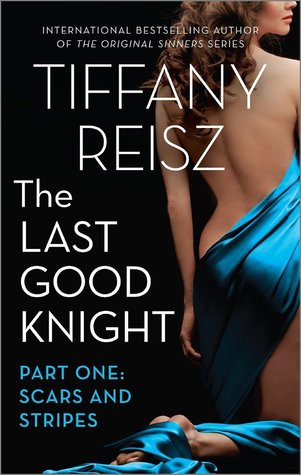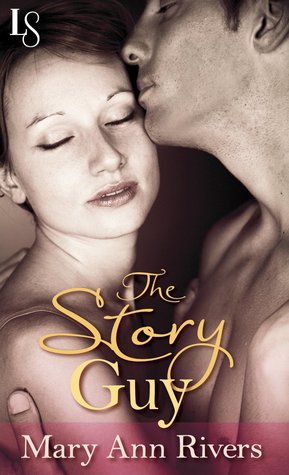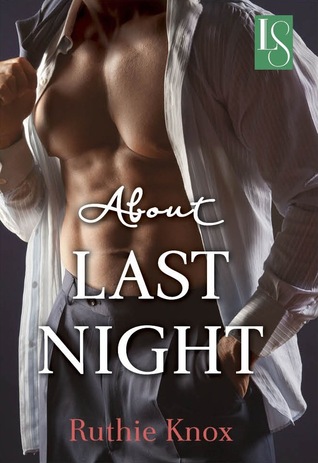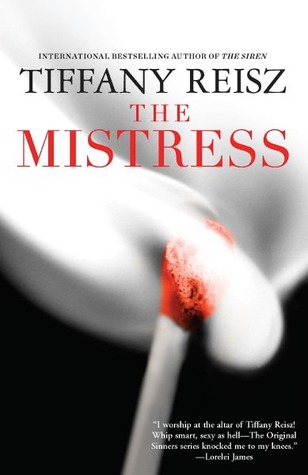So, I guess I should first mention that this post is part of the blog tour (I hope that’s obvious.) There’s a tour-wide giveaway here — check it out!
I read and loved the first four books in Tiffany Reisz’s Original Sinners series. (I say the first four books, but it’s kind of like Star Wars... the series started with the fourth (or fifth, if you count the novella) one.) So when I heard about this novella, I was pretty excited about it. Then I heard it was being released as a serial and I worried a little bit.
The Last Good Knight: An Original Sinners novella told in five parts:
It’s lust at first sight when Mistress Nora encounters a sexy newcomer to The 8th Circle. She’s happy for the distraction, since she left her lover, Søren, but her session with Lance is cut short when her boss, Kingsley Edge, reveals they’re all in danger….
Part II: Sore Spots
With a potential stalker on the loose, Kingsley hires Lance as Nora’s bodyguard, but stipulates no sex while he’s on duty. Frustrated by the ex-SEAL’s noble chivalry, Nora is driven to seek release with the one man she’s trying to forget….
Part III: The Games Destiny Plays
Shocked to see Nora’s bruises, Lance is furious that she put herself in danger and demands to know where she got them. As Nora confesses her true nature, she’s equally shocked to learn that Lance has some secrets of his own, drawing them together despite Kingsley’s orders….
Part IV: Fit to Be Tied
With her feelings for Lance warring with her recent encounter with Søren, Nora returns to Lance’s bed and finds herself toying with the idea of…toying with him on a permanent basis. But after she gets a glimpse into his personal angst, Nora realizes she has the power to rescue this white knight….
Part V: The Last Good Night
Now that the perpetrator has been apprehended, Nora sadly acknowledges she doesn’t need a bodyguard anymore. She adores Lance and wants to keep him but is faced with a dilemma. If she uses her connections to help Lance, she’ll have to give him up forever…
The bottom line is that I liked this novella, but I have a few reservations about leaving it at that. I’ll put ’em in a list. I know you’ve been missing my lists.
- It’s a serial novella. That means that each $0.99 installment gives you about 25-30 pages of reading, with the expectation that you’ll purchase the other 4 installments to continue the story. Novellas are fast-paced little bites of stories anyway, and it’s slightly irritating to receive the story in this incremental format. I read them as ARCs — meaning that I had all five to start with (and I didn’t pay for them), and I was still slightly annoyed every time I had to find the next installment in my library and try to get back into the story. If you’re worried about the cost, I’ll be fair and put it in perspective… the total price for this approx. 120-page story is $4.95… the average Harlequin Presents story is about 180 pages long and costs $4.99. It’s up to you to decide whether a bit of Tiffany Reisz erotica is worth slightly more per-page than an HP. My main irritation stems from the (admittedly ridiculous) inconvenience of having to open up five different books during one rather short reading experience. I know — I’m nit-picking — but novellas are already bite sized… do we really need to break them down further than that?
- Read those blurbs again… The thing is, the villain that drives most of the plot — that brings Nora and Lance together in a no-touching-allowed way — is an entirely off-page thing that never seems to be as big a deal as the characters believe. It’s like all the characters have these huge reactions to an invisible monster that turns out to be a nuisance rather than a danger.
- This one’s possibly just me, but it was a little weird reading a book about Nora and the other OS crew that takes place before The Siren, because OS books 2-4 so completely changed my views on Nora and Søren. It wasn’t a bad thing, but it was a little difficult for me to get into the right brain space to read this story. I suspect i’ll have the same problem with the other OS books (the prequels. Here’s hoping there aren’t any droid armies, Yoda fights or epic NOOOOOOOOOOOOOOOOOOOOOOOOOO moments in those books. I don’t think I could take it.)
So, yeah, those things were kind of strange or irritating, but I did like the novella. Once I got over the weirdness of going back in time with Nora and Søren, I loved how their dynamic played out. It’s also fantastic how you can read The Siren again after reading this novella and get another perspective on the Nora/Søren interactions. And I loved how the interludes between Nora and Lance, while necessarily short-lived, manage to be emotionally true and compelling. While the ending was a little bit heartbreaking, it was a really good kind of heartbreak.
While I’m not completely sure why this story needed to be told (maybe just to introduce Lance to the world?… Actually, that’s enough of a reason for me), I enjoyed reading it.
Amazon: (US Links)<br>Part I: http://amzn.to/1fVdUvP<br>Barnes & Noble:<br>Part I: http://bit.ly/RM6jI5
If you’re interested in more information about the author, check her out in the usual places: Twitter: @TiffanyReisz https://twitter.com/tiffanyreisz, Facebook: https://www.facebook.com/littleredridingcrop, and Website: http://www.tiffanyreisz.com/.
 Tiffany Reisz lives with her boyfriend (a reformed book reviewer) and two cats (one good, one evil). She graduated with a B.A. in English from Centre College in Danville, Kentucky and is making both her parents and her professors proud by writing BDSM erotica under her real name. She has five piercings, one tattoo, and has been arrested twice.
Tiffany Reisz lives with her boyfriend (a reformed book reviewer) and two cats (one good, one evil). She graduated with a B.A. in English from Centre College in Danville, Kentucky and is making both her parents and her professors proud by writing BDSM erotica under her real name. She has five piercings, one tattoo, and has been arrested twice.
When not under arrest, Tiffany enjoys Latin Dance, Latin Men, and Latin Verbs. She dropped out of a conservative southern seminary in order to pursue her dream of becoming a smut peddler. Johnny Depp’s aunt was her fourth grade teacher. Her first full-length novel THE SIREN was inspired by a desire to tie up actor Jason Isaacs (on paper). She hopes someday life will imitate art (in bed).
If she couldn’t write, she would die.
*FTC Disclosure – I received e-galleys of all 5 installments from Harlequin via NetGalley in exchange for an honest review.*






























